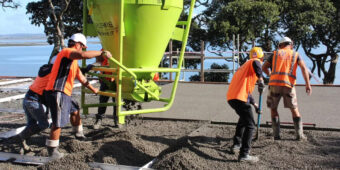BCAs reject Government statement
14 Apr 2025, Building & Housing, Industry News, News

Building Consent Authorities (BCAs) from across New Zealand have pushed back against Building and Construction Minister Chris Penk’s statement that BCAs are intentionally stalling building projects
Building and Construction Minister Chris said BCAs are causing “unnecessary delays” by using a Request for Information (RFI) to “stop the clock” on applications to meet statutory 20 working day targets.
“Councils are stopping the clock on applications by requesting additional information, extending processing times beyond the official 20 working day target,” said Penk.
“Complete annual data for 2024 paints a stark picture: two thirds of applications required an RFI, adding an average of nearly 12 extra days to processing times.
“That’s 12 more days of projects stalling. Time is money for our tradies and officials estimate [that] a 12-working-day delay [due to] an RFI could cost around $4,000 per dwelling. Last year, 94,362 applications triggered an RFI.
“Every unnecessary delay affects real people – builders, businesses and families waiting for their homes to be completed.”
BCA response
Some BCAs, such as Buller District Council, are confident Penk’s concerns don’t apply to them and would prefer not to be tainted with the same brush.
“Buller’s performance is standout when compared to the majority of other councils’ processing times. This is a case of one size doesn’t fit all. 93.4% of BDC applications were processed within the statutory period, so the issue should be focused on those not achieving that target,” said Group Manager Regulatory Services Simon Bastion.
Taupō District Council said that it only asked for further information when an application wasn’t up to scratch.
“Our BCA only sends out RFIs where the information supplied on consent applications is insufficient or unclear,” said Warrick Zander, General Manager Strategy and Environment.
Christchurch City Council (CCC) echoed the sentiment, saying that it only issues RFIs when necessary, and that it does so to ensure housing remains healthy and liveable for generations.
“RFIs are requested when information is missing or it is not clear how the information provided will be compliant with the code,” said a spokesperson. “So, this is done for the benefit of current and future property owners.”
The Council also pointed out that its processing times fell well short of the mandated 20 days.
“Since January 2024, the average number of days to process that consent is 12.6 days. The time our Council takes to process a consent has little impact on the overall delivery of a residential project.”
RFIs – only issued to fill gaps in applications
Ian McCormick, GM Building Consents, Auckland Council, said he agreed with Penk’s plan to reduce the amount of RFIs councils ask for and welcomed moves to speed up the consent process. However, he disagreed with the Minister’s reasoning.
“We agree that improving the quality of building consent applications, so that building consent authorities do not need to ask for additional information, will substantially improve the time it takes to grant a consent.
“Building consent timeframes largely reflect the complexity of the application and its quality (completeness and compliance with the Building Code.) Highly complex or incomplete and poor applications will tend to attract more requests for information and take longer to grant.
“Additional information requested can include missing documents or detail, or even design amendments to ensure it complies with the Building Code and delivers a durable product for the owner.”
McCormick said typically, 87% of applications were completed within 20 working days. However, the majority of those were incomplete and required additional information – which was slow to come back to the council.
“For example, during the week of 17 March, 80% of the applications were incomplete or required modification to the design, requiring a request for additional information,” he said. “On average, 1.7 requests were made per consent. Applications typically spent a further 16 days waiting for a response by the applicant to the council’s request for information, such as to provide missing documentation.”
A time and money saver
He warned that fast-tracking the building consent process could result in pain further down the line.
“If the plans are not ‘buildable’ and code compliant, the cost of re-work and delays on site will be substantial, not to mention the ongoing financial cost and mental angst for owners having to remediate building defect related damage at some later date. We have been here before.”
Auckland Council’s experience mirrors a study undertaken by BRANZ. The research showed that 86% of RFI items relate to sender (Design LBPs, architects and engineers) behaviour and only 14% to receiver (BCA) behaviour.
“Of this 86%, missing documentation accounts for 66%, incorrect documentation 10% and coordination issues (say, between architect and engineer) 5%, with obscured documentation both a sender and receiver responsibility, and thus shared at 5%,” said the study.
The study continued to say “it is the sender’s response time [to RFIs] that creates consenting delays” and calculated that in 2023, there could be up to 600,000 RFIs across New Zealand, resulting in half a million days lost.
“One sender myth is the belief that the 20-day clock is being used by BCAs to delay time (say, to aid resourcing). Stage 3 of our Data Deep Dive followed every communication between a sender and receiver across n=160 consents. We found little evidence of systemic delays or the mythical stop-clock,” said the report.
Register to earn LBP Points Sign in



